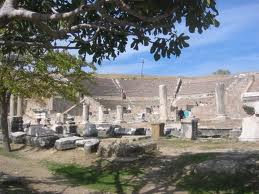Dream practices in ancient Greece
Dreams play a prominent role in the epic poems of Homer in which divine messages are relayed to the heroes through their dreams (Hiestand, 1994, pp. 15 - 20). Van de Castle made the point that in the Illiad, the dreams are sent by Zeus to male heroes, while in the Odyssey, they are sent by Athena to women. He remarked that "The messages sent are generally straightforward and direct, and their meaning is readily understood". He further noted that in the Illiad there is an interesting occurrence that is also found in modern dreams, namely that when Achilles wants to overtake Hector under the walls of Troy in his dream, he is unable to run well, suffering from a form of dream paralysis (Oppenheim, 1956, p. 60). Penelope's dream of the geese and the eagle in the Odyssey provides an example of an allegorical or symbolic dream.
Van de Castle observed that dreams in the Greek tragedies seldom come from the gods, are usually allegorical and prophetic and are experienced by women. In this regard he referred to the plays "Choephoroe" by Aeschylus and "Oedipus Rex" by Sophocles.
He went on to describe a change in mentality that seems to have occurred at some point in the fifth century B.C. , possibly influenced by contact with other cultures, most notably India. Up to that point, Greeks "saw" dreams, he said, but didn't "have" them. Afterwards, though, they began to believe that the "soul was able to leave the body, take trips, or visit with the gods" (Oppenheim, 1956, p. 61). Van de Castle noted that it was at that time that the first dream book was written, apparently by Antiphon, an Athenian statesman, and that the first known continuous dream diary was recorded by Aristides, who lived from 530 to 468 B.C.. He said it originally must have consisted of nearly three hundred thousand lines and much of it is still extant, gathered into five volumes called Sacred Teachings.
In further passages, Van de Castle went on to describe the Greek use of incubation in their healing practices, but the passage is much to extensive to quote it all here. It is also treated in Meier (Meier, 1967, 12). In that connection, Van de Castle wrote about the god Aesculapius and the healing shrines devoted to his worship at Epidaurus, Pergamos and Cos, as well as the famous Greek doctors Hippocrates and Galen. He also devoted some space describing Plato's and Aristotle's views of dreams. He quoted Aristotle as observing, "The most skillful interpreter of dreams is he who has the faculty of observing resemblances" (Van de Castle, 1994, pp. 62 - 65).
While on the subject of the ancient Greeks and dreams, it should be mentioned that Alexander the Great had a personal dream interpreter named Aristandros who advised him about when to commence battles and when not to (Hiestand, 1994, p. 24). It might be interesting to once compile a book about famous dream interpreters down through history.
Previous section Next section List of sections List of chapters

